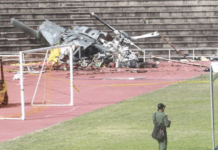IPOH, March 19 — The Cabinet has approved the Compulsory Attendance Order (CAO) to be extended from detainees serving sentences of less than one year to three years in a bid to overcome the current problem of overcrowding in prisons.
Home Minister Datuk Seri Hamzah Zainudin said that, at the same time, the government also agreed to increase the CAO period from just three months to one year.
“We approved it (at the Cabinet-level) last week and, InsyaAllah, we will seek the consent of Tuanku (the Yang di-Pertuan Agong) after this.
“Based on the Offenders Compulsory Attendance Act, 1954, the CAO is only for those serving sentences of one year and below, but this time I’ve asked that offenders who are serving sentences of three years and below to also be included in the CAO.
“This means that for minor offences that we can take care of we will do the normal parole. We will also add other assets to ensure that prison officers and personnel can control those who have been sentenced through this CAO,” he told reporters after the Home Ministry’s Malaysia Prihatin Programme today.
According to the Malaysian Prisons Department, the CAO is a punishment enshrined in Malaysian law under the Offenders Compulsory Attendance Act, 1954.
It is an alternative to imprisonment for those convicted of certain offences to serve out their sentences by doing “compulsory work” without compromising their daily lives.
Last December, Hamzah was quoted as saying that steps to intensify the implementation of the parole system, CAO and Correctional Rehabilitation Centre were among those taken by the government to tackle the problem of overcrowding in prisons.
In another development, he said the Special Task Force on Organised Crime (STAFOC) and Special Task Force on Anti-Vice, Gambling and Gangsterism (STAGG) would not be re-established to handle major criminal cases and secret society activities in the country.
He explained that as the Royal Malaysia Police (PDRM) already had sufficient teams, there was no need to add other special action teams for now.
“We feel that we can do without STAFOC and STAGG. What’s important is that we need to take action in accordance with existing laws,” he said.
The two teams, established in 2014, were dissolved in 2019 under the Pakatan Harapan (PH) government as part of a restructuring of the PDRM.
Meanwhile, he said police had already taken action against those involved in a funeral procession in a multi-purpose vehicle (MPV) displaying a logo believed to be linked to secret society. The procession went viral on social media last Wednesday.
“If we had taken action against them during the procession, people will say police are cruel. But we took action the moment it ended and investigation is already underway,” he said.
Last Wednesday, a video clip showing a van displaying the picture of a 28-year-old man, who died in a road accident on Sunday, and a logo believed to that of the Secret Society 36 group affixed to the front of the vehicle together with wreaths for the funeral.
Most netizens agreed that the government needs to take stern action against individuals involved in the procession as any activity that violates the country’s legislation and involves organisations not recognised by the government is wrong.



















